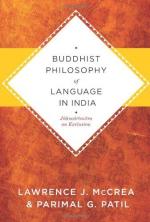|
This section contains 3,181 words (approx. 11 pages at 300 words per page) |

|
By the fifth century BCE great social change was taking place in India and a period of intense intellectual activity came into being. Rational inquiry into a wide range of topics was under way, including agriculture, architecture, astronomy, grammar, law, logic, mathematics, medicine, phonology, and statecraft. Aside from the world's earliest extant grammar, Pāṇini's (c. 400 BCE) Aṣṭādhyāyī, however, no works devoted to these topics actually date from this period. Nonetheless, scholars agree that incipient versions of first extant texts on these topics were being formulated.
One text dating from this period and important to tracing the development of logic in classical India is a Buddhist work, Moggaliputta Tissa's Kathā-vatthu (Points of controversy; third century BCE), which exhibits awareness of the fact that the form of argument is crucial to its being good. The text...
|
This section contains 3,181 words (approx. 11 pages at 300 words per page) |

|


